January 25 - 31, 2015: Issue 199
Sarah A. Biddy Lewis Martha Catherine Benns
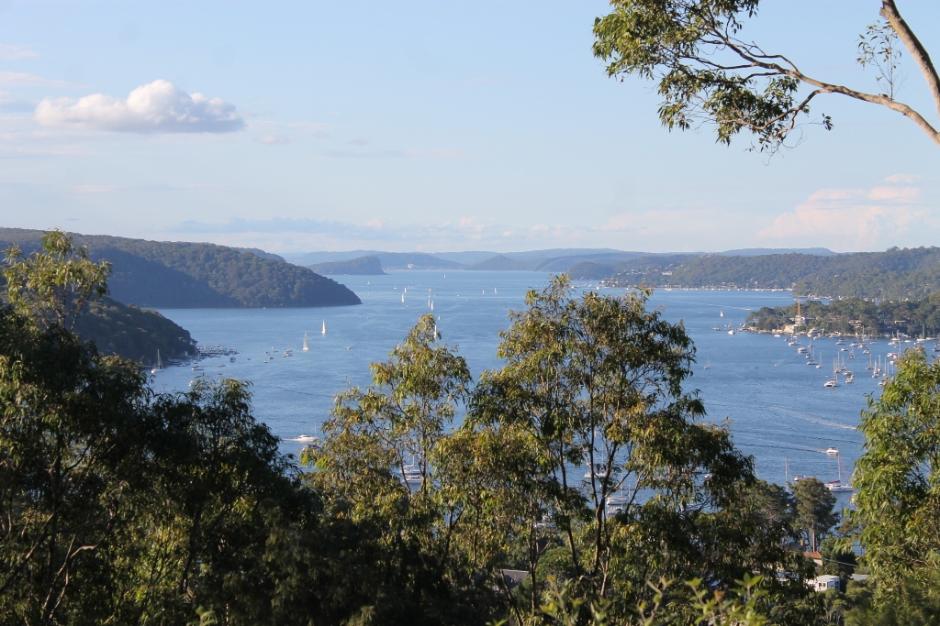
Sarah Lewis Ferdinand (1800/3?- 1880) and Martha Catherine Benns (1838 - May 6th, 1920)
Countless tributes to Bungaree (sometimes spelt ‘Boongarrie’) abound in the early papers of the colony of Sydney- places were named after him - like Bungary North (Norah Head ) and Bungary beach near Brisbane, hotels were called King Bungaree, there was a King Bungaree stage, which ran to Liverpool, and vessels both large and small were all named after this early greeter of those coming to a new for them but in reality, ancient world and culture.
What is known of the women who bore his children though – apart from short references to these mothers? As matriarchs, constant reference to one of these ladies daughter's ability as a midwife recurs, her skills as a fisherwoman – traits that seemed to be passed from one generation to the next, as her daughter then becomes a midwife to many too.
Finding the voice of the two ladies, mother and daughter, we would celebrate as the last in this first round of Pittwater Matrirachs, begins at least on January 31st, 1815 – two hundred years ago this Friday, January 31st, 2015:
On Tuesday last, at an early hour, His Excellency the GOVERNOR and Mrs. MACQUARIE, accompanied by a large party of Ladies and Gentlemen, proceeded in boats down the Harbour to George's Head.
The object of this excursion, we understand, was to form an establishment for a certain number of Natives who had shewn a desire to settle on some favourable spot of land, with a view to proceed to the cultivation of it. - The ground as signed them for this purpose (the peninusla of George's Head) appears to have been judiciously chosen, as well from the fertility of the soil as from its requiring little exertions of labour to clear and cultivate; added to which, it possesses a peculiar advantage of situation; from being nearly surrounded on all sides by the sea; thereby affording its new possessors the constant opportunity of pursuing their favorite occupation of fishing, which has always furnished the principal source of their subsistence.
On this occasion, sixteen of the Natives, with their wives and families were assembled, and His EXCELLENCY the GOVERNOR, in consideration of the general wish previously expressed by them, appointed Boongaree (who has been long known as one of the most friendly of this race, and well acquainted with our language), to be their Chief, at the same time presenting him with a badge distinguishing his quality as "Chief of the Broken Bay Tribe," and the more effectually to promote the objects of this establishment, each of them was furnished with a full suit of slop cloathing, together with a variety of useful articles and implements of husbandry, by which they would be enabled to proceed in the necessary pursuits of agriculture : - A boat (called the Boongaree), was likewise presented them for the purpose of fishing.
About noon, after the foregoing ceremony had been concluded, HIS EXCELLENCY and party returned to Sydney, having left the Natives with their Chief in possession of their newly assigned settlement, evidently much pleased with it, and the kindness they experienced on the occasion. Sydney, SITTING MAGISTRATE—W. BROUGHTON, Esq. (1815, February 4). The Sydney Gazette and New South Wales Advertiser (NSW : 1803 - 1842), p. 1. Retrieved from http://nla.gov.au/nla.news-article629052
Sarah is known to have spent time at this farm, her surname then 'Wallace'. Although Bungaree does not seem to have done much farming the peaches that came from these lands were supposed to be some of the best in the colony and kept him and his peoples able to purchase other items they may have wanted.
Sarah, born at Broken Bay in 1800 or 1803 (also Sarah Lewis, Sarah Ferdinand and Granny or Biddy (Bidgee?) Lewis and Biddy Salmander or Salamander- see mispronunciation of names in Extras below and then run LewisFernandez together - ?) was the daughter (or grand-daughter) of Bungaree and the sister of Bowen Bungaree. Her mother, or grandmother, was Matora, Bungaree's first wife - some sources stating he had five wives.
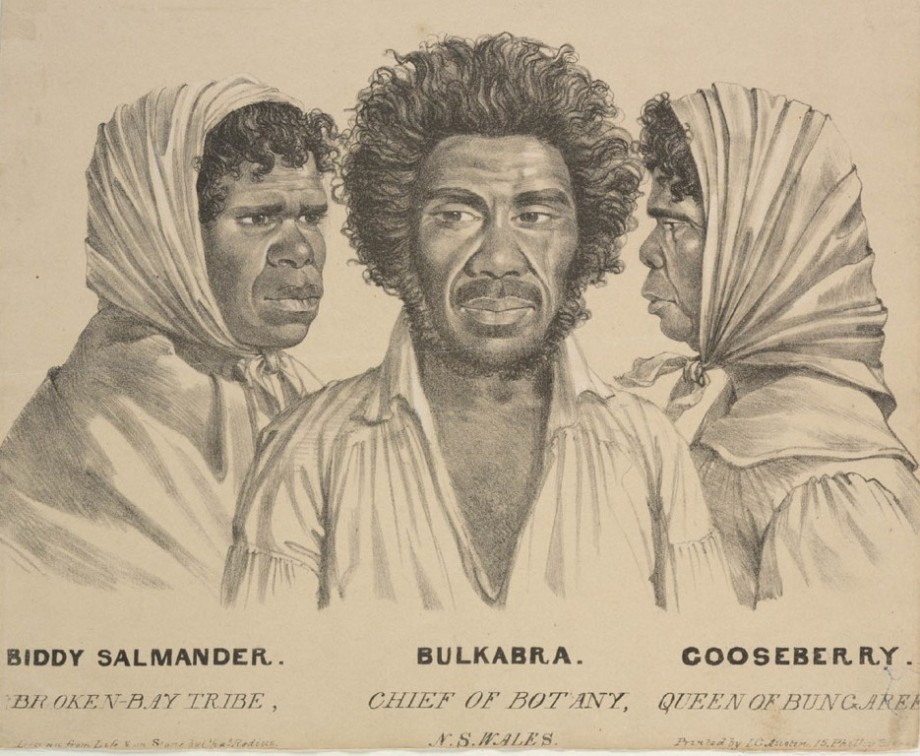
Biddy Salmander / Broken Bay Tribe [&] Bulkabra / Chief of Botany, / N.S. Wales [&] Gooseberry / Queen of Bungaree by Charles Rodius then turned into this Lithograph - see sketch. Image no a1114011h, courtesy State Library of NSW.
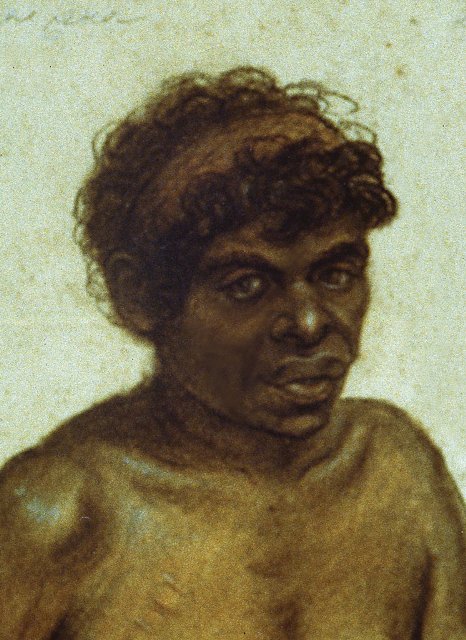 Queen Matora (also Toura - picture to right), according to Reverend Lancelot Threlkeld, mut-tau-ra, meant 'small snapper' in the Newcastle-Lake Macquarie ('Awabagal') language group, to which this mother of Sarah and Bowen (Boin) may have belonged. In Yabbying In Warriewood Creeks one of the articles we found during research states Bungaree was a frequent visitor to one settler's home and another under Extras by Rev. Threlkeld shows these lands were a place he walked on.
Queen Matora (also Toura - picture to right), according to Reverend Lancelot Threlkeld, mut-tau-ra, meant 'small snapper' in the Newcastle-Lake Macquarie ('Awabagal') language group, to which this mother of Sarah and Bowen (Boin) may have belonged. In Yabbying In Warriewood Creeks one of the articles we found during research states Bungaree was a frequent visitor to one settler's home and another under Extras by Rev. Threlkeld shows these lands were a place he walked on.
Other references to her daughter and granddaughter also cite a small, quick and intelligent woman in both cases.
Sarah did not stay at what is now called 'Bungaree's Farm' for very long - walking to Pittwater, along the tracks now used as roads here or those closer to the coast was common practice. From at least 1822 she was with Prussian convict John Lewis Ferdinand. Some state they met in 1815 on the Georges Head grounds as he arrived, transported 'for life', in January 1815. John Ferdinand (also Lewis) had fought in the Napoleonic Wars and worked at John Grace’s lime-burning business in Marra Marra Creek by the early 1820's.
There is also some indication that this daughter or grand-daughter of Toura may have had a British sailor as part of her parentage. On her death certificate one 'Richard Wallace' is named as her father and as being 'aboriginal'. It seems more likely he may have been this gentleman, also moving elsewhere in 1822: RICHARD WALLACE, Third Officer of the Ship Clydesdale, leaving the Colony in the said Vessel, requests Claims to be presented. Classified Advertising. (1822, November 29). The Sydney Gazette and New South Wales Advertiser (NSW : 1803 - 1842), p. 4. Retrieved fromhttp://nla.gov.au/nla.news-article2181466
By 1833 Sarah was applying for land on Marra Marra Creek - a tributary of the Hawkesbury River. Sarah had returned to homelands and waters for what was then called The Broken Bay Tribe. Her determination to secure the ground under her feet may possibly be due to Bungaree's earlier experience in 'Elizabeth Town' and then 'Bungaree's Farm':
35. Cumberland, 4 acres, parish of Murramurra, on Mother Marr's Creek; opposite the land occupied by John Grace: applied for by John Blake. Price 5s, per acre.
36 Cumberland, 4 acres, parish of Berowra on Mother Marr's Creek; westward of the land occupied by Sarah Ferdinand: applied forby James Byrne. Price 5s. per acre.
37. Cumberland, 4 acres, parish of Murramurra on Mother Marr's Creek ; westward of the land occupied by John Grace: applied for by Sarah Ferdinand. Price 5s per acre.
38. Cumberland. 4 acres, parish of Berowra on Mother Marr's Creek; a little eastward of the land occupied by John Grace: applied for by John Hunter. Price 5s. per acre.
39. Cumberland, 12 aore3, parish of Berowra, on Mother Marr's Creek ; westward of the land occupied by John Hunter: applied for by John Grace. Price 5'. Per acre. Classified Advertising. (1834, December 20). The Sydney Gazette and New South Wales Advertiser(NSW : 1803 - 1842), p. 4. Retrieved from http://nla.gov.au/nla.news-article2217794
No. 35. 4 acres, parish of Murramurra, on Mother Marr's Creek, by John Blake. No. 36. 4 acres, parish of Beroura, on Mother Marr's Creek; by James Byrne. No. 37. 4 acres parish of murra murra on Mother Marr's Creek, by Sarah Ferdinand. No.- 38. 4 acres, parish of Beroura, on Mother Marr's Creek, by John Hunter. No. 39. 12 acres at same place by John Grace. Advertising. (1835, March 5). The Colonist (Sydney, NSW : 1835 - 1840), p. 7. Retrieved from http://nla.gov.au/nla.news-article31716273
Five Acres of Land, all Cleared - PARISH OF BEROWRA. GENERALLY KNOWN AS ON MOTHER MARR'S CREEK, In the County of Cumberland.
BY MR. STUBBS on WEDNESDAY, the 27th day of April, 1842, at the Mart, King street, immediately after the Castle Hill Property. DESCRIBED, Bounded on the cast by a line bearing south ten chains, commencing at the north west corner of the three acres applied for by Sarah Ferdinand at said creek; on the south-west by a line bearing north thirty-nine degrees west, fourteen chains and sixty links to said creek, being the land sold as Lot 36, in pursuance of Advertisement, 13th Dec. 1834.
TITLE GOOD.
This snug little bit of land is in one of those localities singularly advantageous to all persons who are in any way connected with river business,-as it is close to Berowra Creek, and you are soon in the main channel of the splendid Hawkesbury river, upon which thousands get a handsome living. Advertising. (1842, April 13). The Sydney Herald (NSW : 1831 - 1842), p. 4. Retrieved fromhttp://nla.gov.au/nla.news-article12874675
Documents found by living family members, and published in Neil Evers wonderful page Bungaree Was Flamboyant show Sarah succeeded in securing some permanent paradise.
THE SYDNEY MONITOR WEDNESDAY AFTERNOON, JULY 14, 1930.SIR JOHN WYLDE, KNT. CHIEF JUSTICE OF THE CAPE OF GOOD HOPE.
This gentleman, when he hears what passed at Sandwell's on Wednesday evening, will no doubt feel infinitely indebted to Mr. McLeay and this Government for the attention they shewed him on that occasion. In Governor Macquarie's time, the notorious Elizabeth Bay, was possessed by an old soldier, very tall and straight and venerable, and very aged. He sold his right to the plan, to the late Mr. John Thomas Campbell, Member of Council, for an annuity for his life. Governor Macquarie pitched upon the spot to form a fishing establishment for the Sydney Blacks, seeing, that the Colonists had driven them from their fishing and oystering stations in the Domain, at Bennelong's Point, Dawes's Point, and Cockle Bay,(except for the term of this administration "Darling Harbour."), Philanthropy being the basis of the project, Governor Macquarie asked Mr: Campbell to give up his claim to Elizabeth Bay? He did so.
Huts and boats for the natives were-constructed at the King's expense, and down sat Bungaree and the remnants of the several sable tribes, who, on the landing of Governor Philip, occupied the above-mentioned places in great numbers. This plan of General Macquarie of domesticating the natives, was neglected or opposed by Major Goulburn, to whom Sir Thomas Brisbane left the management of all the Schools and charitable Institutions in the country; and so the Blacks gradually drew off from "Elizabeth Town ;" the name which General Macquarie gave this new hamlet of the Aborigines. It pleased the present Governor "in his pleasure," to feather the nest of our seven hundred a year pensioner, and two-thousand-a year salaried Secretary, with various warm and nicely-selected sticks, straws, and wool; among which comfortable commodities, was this same Bay called Elizabeth Town.
In Macquarie's time, our South-Sea whaling trade was not commenced. Quays and private whaling yards, were not then thought of; and land at Elizabeth Bay was not worth more at that time, than a pound or two an acre. But the Sydney finshery had begun to be brisk in Governor Brisbane's time, and when the present Governor arrived, sea-side land began to be held in great estimation. Elizabeth Town was a favourite ride with Governor and Mrs. Macquarie after its establishment, and they often induced their friends to accompany them.
Judge-Advocate Wyide, who at that time considered himself a fixture in the Colony, was so pleased with the neighbourhood of Elizabeth Bay, that he asked the Governor to give him a few acres, for the purpose of making a garden, and when he could afford it, building a country box for the benefit Mrs. Wylde's health and family. Eleven acres were measured off, and the grant was made out to Mr. Wylde, and duly signed, sealed, and delivered. The Colony however began to find great fault with the Judge Advocate and his colleague Justice Field, on account of their curious decisions and monstrous self-imposed fees, the sound of which having reached Downing-street, both were justly removed. The grant contained the usual formal covenants of clearing and cultivating a portion of the land, namely four acres out of the eleven. This of course was a matter of mere form, because the cultivation of four acres of such land(sea-sand) could be no manner of service to the Colony, as to its products. But it was a common covenant, and was inserted as of course.
The lady of Sir John Wylde and family having at length removed, or being about to remove from the Colony, Sir John had been gradually disposing of his lands and livestock in the Colony. And as the last portion, this sea-side allotment of eleven acres, adjoining Mr. McLeay's grant of FIFTY acres, was advertised to be sold at Sandwell's on Wednesday evening last. A great number of persons of capital, assembled. When lo ! just previously to the sale, a letter was read from Mr. McLeay, stating, that the land about to be sold, was claimed by the Government, on the ground, that the four acres which had been cleared and cultivated had been so cleared and cultivated subsequently to the period of five years, prescribed in the deed of grant; and consequently the land had become forfeited to the Crown, and now belonged to the King.
The Auctioneer stood aghast; the bidders looked at each other. At length a gentleman present told the agent of Sir John Wylde, he considered the notice to have greatly injured the sale, for which he had no doubt Sir John Wylde seek compensation on a future day; and in the mean time, he recommended the sale to proceed as he considered the claim set up by Mr. McLeay, to be in all respects invalid. The sale proceeded, and fetched the sum of £910; that is to say, at the rate of about £83 an acre-- i. e. about half its real value. So that here is our beloved Pensioner with the grant of Elizabeth Bay of fifty acres nicely stowed in his iron chest safe and sound, while absent Sir John Wylde, is to be deprived of his eleven acres !
This act of the Government is on a par with that act by which they have ousted Mr. Paine of his mansion at Cockle Bay; and, as it is rumoured, with their intentions to oust all persons who cannot shew a better title to their land, than occupation and purchase.But we ask, would not all these persons have been this moment in possession of grants under the hand and seal of the Governors` of this Colony, if the head Surveyors of the Colony had not been grossly negligent of their duty? What was the reply of these Surveyors, when timid and suspicious persons used to, stammer out to them, with cap In hand, "I hope Sir you will please measure and give me a grant of my allotment before; the next Governor comes, or I may be deprived of my land ?" - Phoh !" said the Surveyor, " do you think the British Government, because of the lack of Surveyors in the office, and over-press of business, will take advantage of its own wrong? Do you imagine the King's Ministers do not consider the Governor here, a corporate person, and, that the act of anyone of them, is the act of his successors? Do you not know, that the alienation of land by a Governor is not the act of the man, in his private capacity as an individual, but the public act of the King's Representative, who never dies nor ceases to govern?" With such arguments as these, were the timid and suspicious grantees silenced. The generous and the sanguine never doubted the stability of these titles. The public now see the result !
Our Chief Justice has decided, that the promises of Governors and their permission to occupy, go for nothing. Their hands and seals only (quoth he) can prevent the King entering into possession ? Thus stands at this moment the tenure of thousands of farms in the interior. On the doctrine laid down, our farm for instance at Lake Bathurst, occupied by us about ten years, but never measured, can be taken possession of by any member of the two FAMILIES, whenever His Excellency, the present Governor shall be pleased to make them a present of the same. Our neighbours have encroached on the original grant promised us by the Governor, and which cost us, in those days, more to settle on it, than it was worth. We cannot resist their encroachments, for we cannot shew our boundaries in a deed !And the boundaries we do shew, and which were pointed out by the Surveyor of those days, before we went 60 miles beyond any other settler, in personal danger from the blacks every journey, the neighbours laugh at. Thus we have a farm and no farm. And the result we expect will, be, that as George Murray has rebuked us for not surrendering our assigned prisoner servants to the Governor, when in " His Excellency's pleasure," he was pleased to require their surrender, though such surrender were attended with our ruin, so we suppose if His Excellency were to send to Lake Bathurst, and enter into possession as our Chief Justice has determined he ought to do as regards Mr. Payne's premises, we should have no remedy.
Thus the King's Prerogative, which is given His Majesty by the Constitution, to enable the King to exercise the prerogative of mercy in case of offenders, and to protect and uphold the rights of his subjects, in cases where the law, from human infirmity, fails of working benevolently, is found in N. S. Wales to accomplish ends of a very opposite nature! Mr. Underwood's land the other day, was entered upon by Lieut. Parry, in the name of the Crown, with force and arms; his fence was violently destroyed before his eyes by a gang of convicts, and himself threatened if he molested them. Surely the best way would have been, first to try the right ? Suppose Mr. Under-wood, fully impressed they were impudent trespassers, had, in the old Irish spirit, come down with his dependents with muskets in their hands, and fired on Mr. Parry and his gang ? " Why" say the lovers of peace and mercy, "Mr. Underwood if found in error, would have been hanged to be sure, and his assistants sent to Moreton Bay to encounter for life, scourging and hunger !"
We will conclude with observing, that the plea for this extraordinary proceeding of the Government, in ousting Sir John Wylde must be, the extreme scarcity of land on the "sea-side near Sydney. But if this be true of eleven acres, why have given Mr. McLeay 50. THE SYDNEY MONITOR. (1830, July 14). The Sydney Monitor(NSW : 1828 - 1838), p. 2 Edition: AFTERNOON. Retrieved from http://nla.gov.au/nla.news-article32073880
Sarah and John had 10 children, seven of whom survive. The family lived by fishing, oyster gathering as well as boat building, lime-burning, shingle making and selling fruit from their orchard, while Biddy acts as midwife for the whole district. A story is told that Lewis, sailing his boat, would often say to Biddy “Sit in the bow of the boat, Biddy, so I can look at your beautiful face”.
Martha Catherine was born October 13, 1838, their fifth child. Records indicate she gave birth to only one child, in 1862, a daughter Emily Mary Ann Elizabeth, whose father is said to be one Eugene Stevens, a water policeman, although 'Sanville' appears a little further on as her surname, and then 'Stevens' when her daughter marries.
In 1874 Martha Catherine married Joseph Benns, a Belgian master mariner born around 1816 in Brussels. He changed his name from Ambrol Josef Diercknecht, possibly due once again to people here being unable to pronounce names correctly (?) and leased Scotland Island for seven years in 1855.
Marriage 590/1874: BENS JOSEPH to SANVILLE CATHERINE - SYDNEY - NSW State Records - Births, Deaths Marriages
Here too was an abundance of peach trees! Mr Benns is credited with rebuilding the house of Andrew Thompson. He also owned the “William and Betsy” which foundered off Port Stephens and then “The Lady and the Lake” which was wrecked off Long Reef. Both of these traded up and down the Hawkesbury so that may have been where he first met Martha:
COASTERS OUTWARDS. March 10.-Rover, William and Betsy, and Bride, for the Hawkesbury.; Triumph, for Newcastle; Moonta Bay, for Shoalhaven. COASTERS OUTWARDS. (1855, March 12). The Sydney Morning Herald (NSW : 1842 - 1954), p. 4. Retrieved from http://nla.gov.au/nla.news-article12966620
COASTERS-JULY 21. Inwards.-Catherine, from Broken Bay, 250 baskets shells, 34,000 shingles, 200 dozen oranges ; William and Betsy, from the Hawkesbury, 7600 shingles, ..t bushels maize, half ton bark : SHIPPING RECORD. (1857, July 25). Empire(Sydney, NSW : 1850 - 1875), p. 5. Retrieved from http://nla.gov.au/nla.news-article64983263
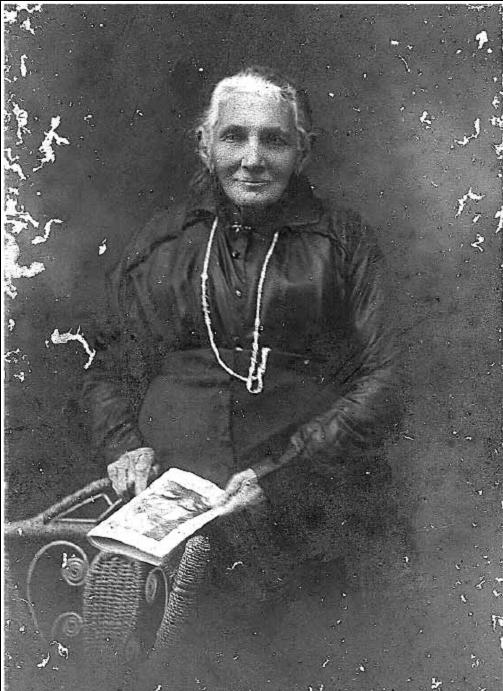
In 1874 Martha and Emily were living on the island with Martha being midwife to many local families. Her grandmother's 'Queen' title, and her reputed bright, intelligent and certainly a dignified nature earned her the title of 'The Queen of Scotland Island':
Right: Martha Catherine, courtesy Bob Waterer, great grandson.
The old church at Church Point has almost disappeared, but we noticed, across the water, the historicic Scotland Island. Andrew Thompson, famous emancipist, successful farmer, merchant, brewer, and magistrate, received Scotland Island as a grant in the early days of the century. He established an extensive salt works there, farmed the land, and, at the time of his death, a vessel, the Geordy, was in the process of being built. Arnbroff Josef Diercknecht, a Belgian, took over the island soon afterwards. He was called locally 'Joe Benns,' and the abbreviation is excusable. He rebuilt Thompson's house with the able assistance of an old bullock. The language Joe used to his bullock was atrocious, but their understanding was complete. Mrs. Benns was known as the 'Queen of Scotland island.' She was a little dark woman of gentle manners, a great kindness of heart, but with a certain regal bearing. Her jewellery Befitted her 'royal' rank. She wore a set of pink coral and gold with eardrops hanging to her shoulders and a magnificent necklet. There is a story that, before her death, she buried her necklace somewhere on the island. Nor is this the only legendary treasure buried on; the island. A three-legged pot full of holey dollars is; said to have been hidden there by two men in a stolen boat full of stolen treasure in Andrew Thompson's time. ROADS OF TO-DAY—TALES OF YESTERDAY. (1937, August 25).Sydney Mail (NSW : 1912 - 1938), p. 43. Retrieved fromhttp://nla.gov.au/nla.news-article160498911
SCOTLAND ISLAND
CHATEAU TANUNDA SCRAPBOOK No 16
There is very little about Scotland Island(in the southern portion of Pittwater) to suggest that once it was of considerable importance in the affairs of the young colony. Today its heavily timbered slopes, save for the cleared spaces about the few isolated cottages would seem to be in almost the same condition as they were over a hundred years ago. In spite of this, however, the island was the scene of a considerable ship-building industry in the early years of the last century, in addition to being the site of extensive salt-works. It was Andrew Thompson, that stalwart pioneer of the Windsor district, who was the first owner of the island. It was Thompson, too, who gave to it its name in honour of his native Scotland.
On the island he built his home, established a farm, and carried on a prosperous business for some years, combining shipbuilding with his other interests. When he died in 1810 the "Sydney Gazette" made mention of the launching of a vessel at Scotland Island, "one of the finest ever built in the colony," and named by Andrew Thompson at the laying-down of the keel as the "Geordy."
After the death of Andrew Thompson many attempts were made to sell the island, but for some considerable time no buyer was to be found, for its isolated position rendered farming there an unprofitable venture, in view of the amount of readily accessible land that had been opened up. For many years the island remained uninhabited; then came a romantic and mysterious person, one Joe Benns, a Belgian who rebuilt Thompson's cottage and established himself on the island in company with his wife. Very little was known of these two, save the obvious fact that they had "known better days." Mrs. Benns was known throughout the district as the "Queen of Scotland Island." She possessed some valuable jewellery, which is supposed to be hidden somewhere on the island to this very day. TUCKER & CO. PTY. LIMITED, SYDNEY. Distributors of Chateau Tanunda Brandy, Tucker's Old Tudor Whisky, Foster's Export (Blue Label) Lager, etc. Advertising. (1942, January 27). The Sydney Morning Herald(NSW : 1842 - 1954), p. 1. Retrieved from http://nla.gov.au/nla.news-article17785081
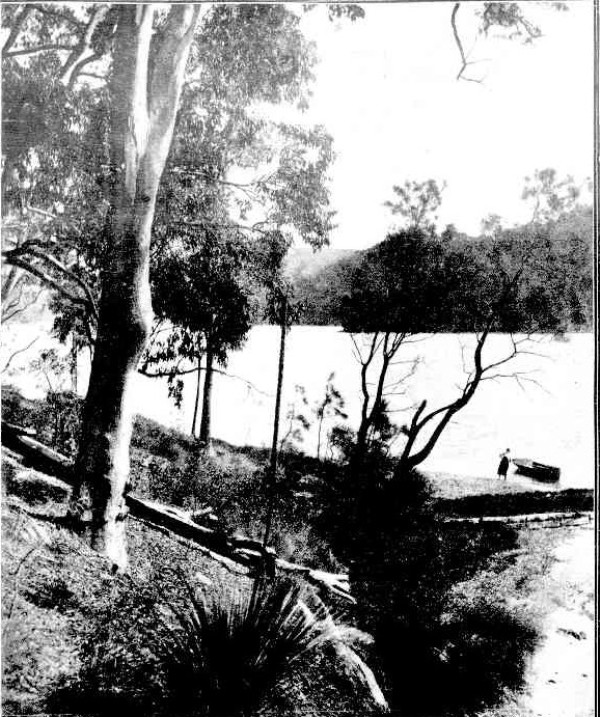
ON SCOTLAND ISLAND, PITTWATER.
This picturesque spot is one of the few privately owned islands in Australia. It lies just off Church Point, at the mouth of McCarr's Creek, Pittwater, an arm of Broken Bay. Not so many years ago the region was practically unknown even to the people of Sydney. Gradually, however, the popularity of the seaside resorts has accounted for the creeping out of weekend cottages and permanent habitations from Manly to Barrenjoey and around the foreshores of Broken Bay and the various inlets near the mouth of the Hawkesbury River. Even Scotland Island itself is now becoming a week-end resort. ON SCOTLAND ISLAND, PITTWATER. (1920, April 21). Sydney Mail (NSW : 1912 - 1938), p. 5. Retrieved from http://nla.gov.au/nla.news-article159028427
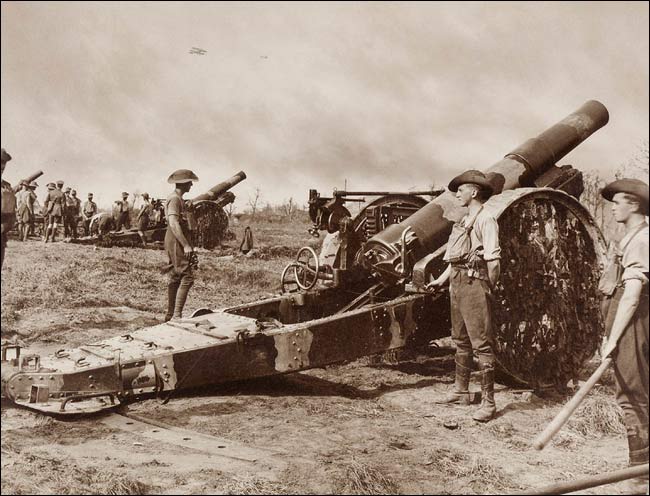 Gnr. H. GODBOLD, S.A. Bde., Pittwater. NEW SOUTH WALES. (1915, September 23). The Sydney Morning Herald (NSW : 1842 - 1954), p. 7. Retrieved from http://nla.gov.au/nla.news-article15615446
Gnr. H. GODBOLD, S.A. Bde., Pittwater. NEW SOUTH WALES. (1915, September 23). The Sydney Morning Herald (NSW : 1842 - 1954), p. 7. Retrieved from http://nla.gov.au/nla.news-article15615446 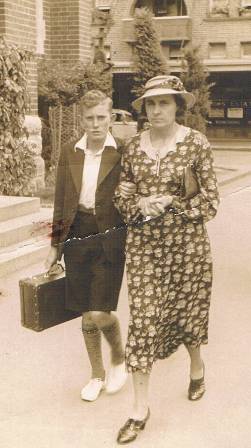 Left: Bob aged 13 with his mum. Photo courtesy Bob Waterer
Left: Bob aged 13 with his mum. Photo courtesy Bob WatererA HAWKESBURY PIONEER.
The death took place on Thursday last of Mrs. M. C. Benns, one of the pioneers of the Hawkesbury River, where she was born 90 years ago. For the past 46 years she resided at Bayview, Pittwater. Two of her brothers are still living, and she has left a daughter, seven grandchildren, and six great grand-children. A HAWKESBURY PIONEER. (1920, May 11 - Tuesday). The Sydney Morning Herald (NSW : 1842 - 1954), p. 10. Retrieved from http://nla.gov.au/nla.news-article15889184
FUNERALS. BENNS. — The Relatives and Friends of Mr. and Mrs. G. GODBOLD are kindly invited to attend the Funeral of their late beloved MOTHER, Martha Benns; to leave 245 Pittwater-road, Manly, TODAY, at 11 a.m., for Manly Cemetery. Family Notices. (1920, May 7). The Sydney Morning Herald(NSW : 1842 - 1954), p. 7. Retrieved from http://nla.gov.au/nla.news-article15888643
Emily lost her husband soon after and he too went to Manly:
GODBOLD.-November 8, 1928, at his residence, 245 Pittwater- road, Manly, George Siby, dearly beloved husband of Emily Godbold , and father of George, Herb, Emily, Addie , Harriet, Milly, and Fanny, aged 74 years. Family Notices. (1928, November 9). The Sydney Morning Herald(NSW : 1842 - 1954), p. 10. Retrieved from http://nla.gov.au/nla.news-article16507923
GODBOLD. -The Relatives and Friends of Mrs EMILY GODBOLD and FAMILY are kindly invited to attend the Funeral of her dearly beloved HUSBAND and their FATHER George Siby ; to leave his late residence 245 Pittwater road Manly, THIS FRIDAY at 4 pm, forChurch of England Cemetery Manly. Family Notices. (1928, November 9). The Sydney Morning Herald (NSW : 1842 - 1954), p. 9. Retrieved from http://nla.gov.au/nla.news-article16507868
And an indication of a family's love:
GODBOLD. In loving memory of our dear dad, George Siby, who departed this life November 8, 1928. aged 74 years
A loving dad. true and Kind.
No one like him on earth we find
Forget him. no. we never will,
As years roll on we love him still.
Memory recalling in fancy we trace
Dad, our darling, your sweet old face,
Inserted by his loving daughter and son. Emily and Norman.
IN MEMORIAM.
GODBOLD -In loving memory of our dear husband and dad George Siby who departed this life, November 6 1928
No one knows how much we miss you.
No one knows the bitter pain
We have suffered since we lost you
Home has never been the same
Inserted by his loving wife and children Emily, George and Fanny
GODBOLD.—In loving memory of our dear father George Siby who passed away November 8 1928
Always so good and kind
Few in this world his equal to And Until his life came to an end
Inserted by his loving daughter and son in-law Milly and Bill and grandchildren Herbert Roy and Thelma
GODBOLD In loving memory of our dear dad and grandfather George who passed away November 8 1928
We often think of you dear dad
And think of how you died
But the saddest part of all was
You never said good bye
Inserted by his loving daughter Addie, son-in - law Hugh grandchildren Agnes and Walter. Family Notices. (1929, November 8). The Sydney Morning Herald (NSW : 1842 - 1954), p. 12. Retrieved from http://nla.gov.au/nla.news-article16600088
And then Emily passed away too - with Memorial's placed by her children to both their parents, expressing love and grief alike that placed above
GODBOLD.-The Relatives and Friends of the late EMILY MARY ANN ELIZABETH GODBOLD are Invited to attend her Funeral; to leave View River Avenue. Carramar, THIS AFTERNOON, at 1.30 o'clock, for the Church of England Cemetery, Manly. Family Notices. (1937, September 30). The Sydney Morning Herald (NSW : 1842 - 1954), p. 9. Retrieved from http://nla.gov.au/nla.news-article17401243
All of these threads do not give you as full a picture as reading the wonderful book Harriet's son Bob Waterer, together with Nan Bosler OAM, published just a few years ago; The Story of Bob Waterer and his Family 1803-2010, which you may still get a copy of and delve deeper into the history of two wonderful midwives and Matriarchs of the Lower Hawkesbury and Pittwater.
A song for Sarah Biddy and Martha Catherine:
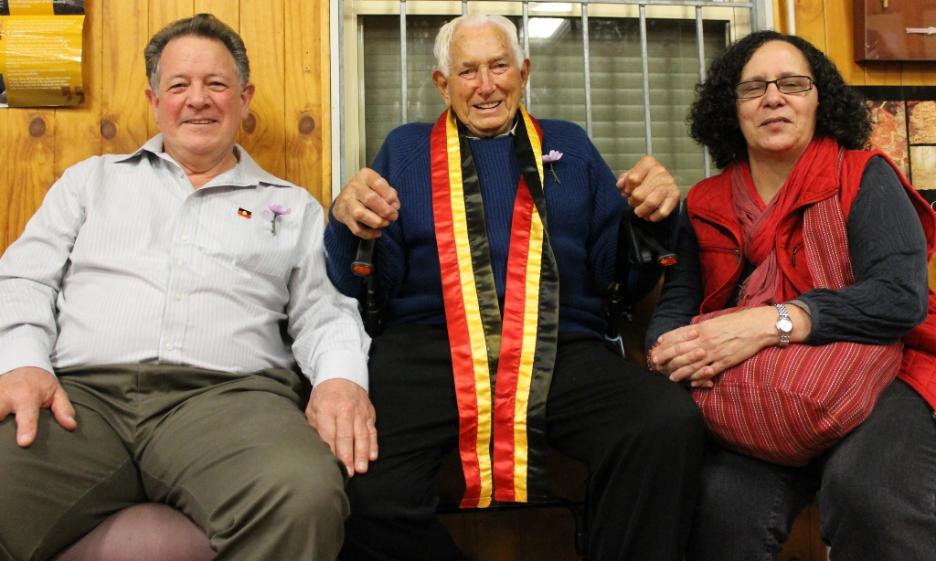
Neil Evers, Bob Waterer and Julie Hendicott 2013
Extras:
NB: Please bear in mind some of these articles reflect the way of thinking of the time they come from - they do not represent current beliefs held by Pittwater Online News - this is a History page, and part of every History is trying to see the environment and societal beliefs around people, and how they thought and spoke. Also bear in mind many early periodicals were inaccurate in their reports as to dates etc. and some were owned or run by people not seeking to be strictly a News Service/ or adhere to what is articulated as the Fourth Estate. These articles are placed here in order for readers to gain insight into what surrounded these mothers and what may have affected their lives and choices as part of the 'atmosphere' of their times.
Fitzgerald, Mary A. King Bungaree's Pyalla and stories [electronic resource] : illustrative of manners and customs that prevailed among Australian Aborigines. by Mary A. Fitzgerald. At: http://www.nla.gov.au/apps/doview/nla.aus-f9622b-p.pdf (42MB)
Other corrupted names have been corrected since the olden times, and we no longer say the Groine for Cortina, in Spain ; and Armony for Armenia, as did. Sir John Mandeville and many other seafaring men, even as late as the days of Dampier.... Of course it was a mistake to give such names to the places, but it was much easier to remember them by so doing. Australians make the same mistakes nowadays when they say : Mother of Mars Creek instead of Marra Marra Creek, and Henriendry or Henry -and-dry for the native name Thariendrai. GEOGRAPHICAL FACTS & FANCIES. (1899, July 27). The Children's Newspaper (Sydney, NSW : 1899 - 1900), p. 12. Retrieved from http://nla.gov.au/nla.news-article62355283
TO THE EDITOR OF THE HERALD.
Sir,-The letter under the above heading by Mr. F. T. Forbes, which appeared quite recently in your journal, is deserving of attention. With the view of reducing the spelling of native names to some uniformity or rule, the late Sir Thomas L. Mitchell, when Surveyor-General, issued the following instructions to his surveyors for their guidance, viz.:-
(Copy )Circular No 29-260.
Surveyor-General's Office,
Sydney, 5th September, 1829.
Sir,- In order to establish uniformity in the spelling and pronunciation of native names, as well as to avoid the printing of long names which are by no means desirable on maps I have to request that you will be particular in spelling such names with as few letters as possible, observing the following rules :-
1st. That where g begins a syllable, it is never to be followed by an h.
2nd. That the vowel u is always to be used instead of the diphthong oo, excepting in the last syllable, when the accent is upon it.
3rd. That no name is to terminate with h.
4th. That the r's are to follow the accented syllable only, and no other.
By avoiding thus unnecessary consonants and diphthongs, names to which home have given 14 letters may be written in nine, as Gulangula for Ghoolonghoolah, Beraweree for Bherrahwherree, Brulee for Bhroulhee, Culapatambo for Coulahpatamboh, and many other words in which there are letters as superfluous as gum trees on the hills.
(Sg.) T. L. MITCHELL, S-Gol. Mr. Surveyor-.
It is evident by this system of orthography that the name Woolloomooloo and many others would be con-fined to their proper limits.
Shortly after my arrival to this colony in 1841, I was fortunate enough to meet at Brisbane Water an aboriginal from whom I received from time to time much valuable information. This man Boy-yo by name, but better known as " Long Dick," was a reputed son of King Bungaree and Queen Gooseberry. He was proud of his parentage, and introduced me to his mother, who, in order to receive me in some state, requested that I should wait until she had put on an old straw bonnet, very much crushed, however, by having been packed away in her bag or wallet with a litter of puppy dogs. This, in addition to the remnant of a much-worn 'possum cloak around her shoulders, made her quite presentable. She was a perfect living skeleton.
On explaining to Dick my desire to obtain a knowledge of his language and an insight into the manners and customs of his countrymen, he told me at once "not to ask questions," that "black fellows did not like to be cross-questioned ," that " black-fellow tell too much gammon " but to look about. Consequently, by following Dick's advice when visiting his or other encampments in different localities, I secured much information.
The custom of extracting a front tooth from each male adult caused many to speak with a lisp, so that at times it was difficult to obtain a correct pronunciation. The women, not having to undergo this ordeal, spoke in clear, distinct tones, and were generally the best informants.
I noticed that many words were used in common throughout the country, such as " Murry," or" Murrum," equivalent to our word very, bulk, or magnitude ; " Baal," or " Bel," a negative ; " Budgery," good satisfactory ; and many others. Also, that every prominent resident in a district enjoyed a distinctive nickname. Thus, a tall and thin settler near Lake Macquarie was called " Turra-Brona," long legs ; a blackbutt tree, "Turramlong ; " a blue gum, " Turrumbrine," on account of their superior height ; and " Turramurra," the name of the highest land between North Sydney and the Hawkesbury River.
" Bidgee " means a flat by a river side, consequently " Murrumbidgee " means a river of many flats, though each bend of the river possesses a separate distinguishing name, more or less historical or biological, the name often extending to many syllables, and unpronounceable to any but blackfellows :-
The name " Kurraducbidgee " is thus formed-" Kurker," a mouth ; " kurradue, ' a native companion, a specie of crane, with a long beak, flocks of which frequented a flat on the Shoalhaven River near Braidwood.
" Gong " refers to a swamp, as Terragong, Cud-gegong, Wolon-gong or Tom Thumb's Lagoon (Wo-lon water), Gerringong (swamp located near to),Coolongatta- Wolon-dilly, water trickling over rocks-&c. Mittagong is altogether misplaced. Its proper position is the Wingecarribee-or bridgee-swamp at the base of the Mittagong Range. The present site was orginally known as " Gibber-gunyah " Creek, that is caves or hollows formed by boulders. " Mill," to see ; " boug," dead or blind. Thus we get " Mill- bong " or bang, " Bong-bong," where the course of the stream is lost in a swamp &c. " Mill-bong Jim " was the name of a notorious blackfellow, blind of one eye, who murdered a family named Gregor at Brisbane in 1845.
Names ending in "alla," "arlie," and the like refer mostly to convenient camping places, as " Eum-bialla " in Capartes, " Piaugalla " adjoining Lonee,Rylstone ; " Urangalla " in the Marulan district, and many other places.
" Wy-Wy," or " Woy-Woy," as it is now spelt, is an exclamation, a caution, equivalent to Take care, Look out, Mind yourself. I first heard it used when out wallaby hunting with Long Dick in the Wolombi Ranges I nearly trod upon a snake, when he uttered this exclamation, and dragged me out of danger. The strip of land onthe right bank of Brisbane Water River, stretching from the Broadwater to Broken Bay and extending inland to base of rocky hills, was infested with snakes of the most venomous description. Black and other coloured snakes sported about in the shallow swamps and got out of your way when disturbed ; but the death-adders, supposed to be the most venomous of all, remained listlessly on the ground, and being much of the same colour as the sandy soil, were objects of great danger, consequently " Wy-Wy " was an exclamation continually uttered by the blacks when visiting this locality-hence the name Woy Woy.
A brother of Dick's wife, a young fellow 15 or 16 years old, attached himself to me : he proved one of the most interesting boys, either black or white, I ever met with. I undertook to teach him to read, and constructed an alphabet on a large sheet of paper. This he fastened to a sheet of bark, and lying on his back with this propped up before him, soon mastered the letters. The letter y, however, he always hesitated at. I always had to say it for him. On one occasion, being otherwise engaged, I repeated the letter quickly, when he jumped up and ran away. He shortly afterwards returned, and folding the paper up gave it back to my keeping, explaining that " y-y." quickly uttered, was a caution against all dangers, including even the " debble-debble " himself. It was some days before his nerves were sufficiently recovered to enable him to resume his studies.
As a rule names now commencing with C should commence with K : " Kugee," instead of Coogee-derived from " Koucha," a putrid smell, no doubt caused by a stranded whale or large fish of some sort ; " Bar-rengerrie " in place of Barren-Joey, " Larella " inplace of Larry's Lake, " Taralga " for Trialgang, and many other misnomers ; also " Eurobodella "in place of Bodalla, previously Boat Alloy. A revision has to be undertaken with caution, or difficulties which the celebrated Mr Pickwick encountered in his endeavours to interpret the mystic inscription " Bill Stumps " x his mark may be met with. I am aware of the existence of two places bearing the name " Waddy-man-dow "-" Wod-dow" an arm, " Waddy " a stick, " Waddy-man "a man with a wooden leg, " dow " an affix by the blacks ; referring, in fact, to the residence of a wooden learned hut-keeper on a sheep station.
I am, &c.,
JOHN F. MANN.
June 20.
TO THE EDITOR OF THE HERALD. (1900, June 22). The Sydney Morning Herald (NSW : 1842 - 1954), p. 7. Retrieved from http://nla.gov.au/nla.news-article14319527
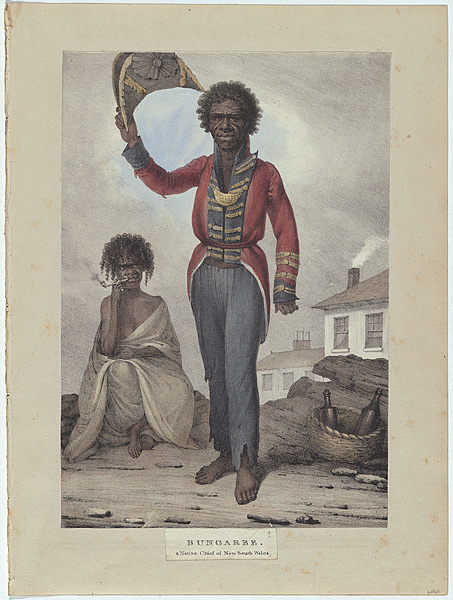 His sable majesty, Bungaree, attended at the Police Office last week, by order of the Superintendent, and received instructions to warn his own immediate liegis, as well as the chiefs of other tribes, that rioting, drunkenness, and disturbing the quiet of the streets at night, would invariably be followed by the punishment of the tread-mill, or, confinement with hard labour. Bungaree bowed politely, promised to use every exertion to carry the orders of their Worships into effect, and retired. THE POWER OF CONTRAST. (1826, March 25). The Sydney Gazette and New South Wales Advertiser (NSW : 1803 - 1842), p. 2. Retrieved from http://nla.gov.au/nla.news-article2185525
His sable majesty, Bungaree, attended at the Police Office last week, by order of the Superintendent, and received instructions to warn his own immediate liegis, as well as the chiefs of other tribes, that rioting, drunkenness, and disturbing the quiet of the streets at night, would invariably be followed by the punishment of the tread-mill, or, confinement with hard labour. Bungaree bowed politely, promised to use every exertion to carry the orders of their Worships into effect, and retired. THE POWER OF CONTRAST. (1826, March 25). The Sydney Gazette and New South Wales Advertiser (NSW : 1803 - 1842), p. 2. Retrieved from http://nla.gov.au/nla.news-article2185525 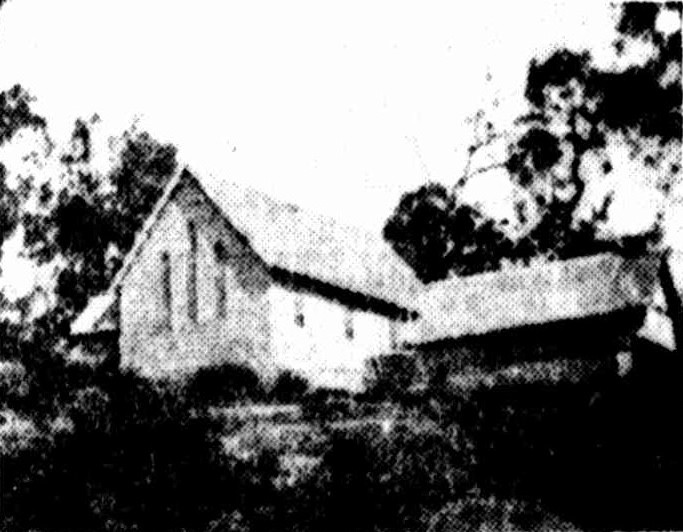
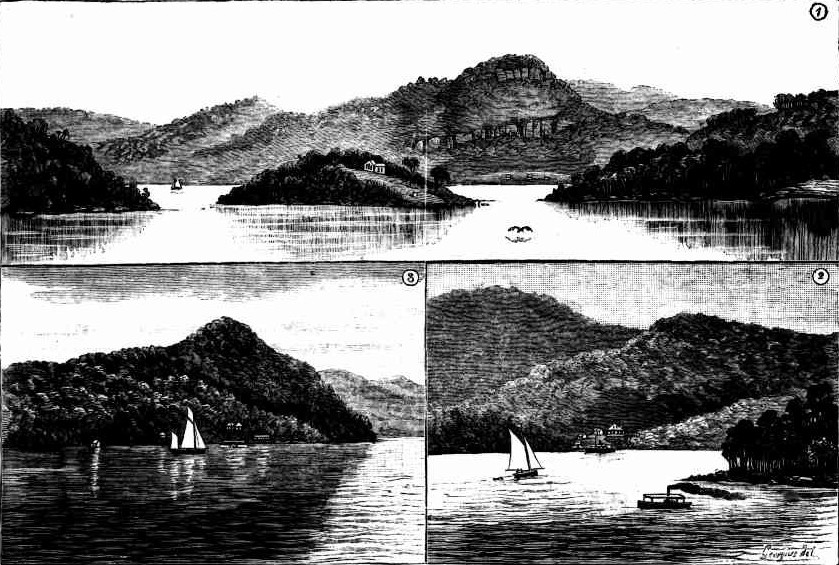
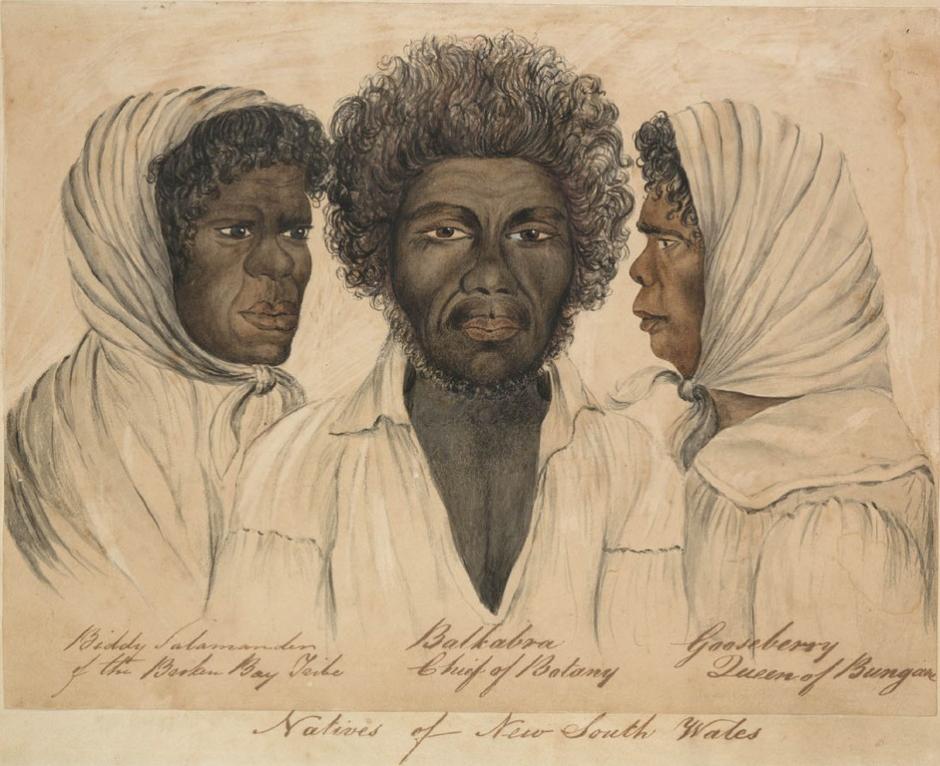
OLD IDENTITIES.
TO THE EDITOR OF THE HERALD.
Sir.-It may interest your readers, and also "A. M. R.," who wrote "An Old Identity" In Saturday's "Herald," to know that I have a lithograph, 9½ inches by 10½, representing three heads - first, "Biddy Salamander, Broken Hill Bay tribe;" second, "Bulkabra, Chief of Botany, N S. Wales;" and third, "Gooseberry Queen of Bungaree." Underneath the three portraits are the words, "Drawn from life, on stone, by Charles Rodens; printed by L. G. Austen, 15 Phillip-street." Perhaps "A. M. R." could tell us something about "Biddy Salamander" and "Bulkabra, Chief of Botany?"
I am, etc., Woollahra, June 6. ROSE SCOTT. OLD IDENTITIES. (1923, June 8). The Sydney Morning Herald(NSW : 1842 - 1954), p. 7. Retrieved from http://nla.gov.au/nla.news-article16054936
Above:Image No.: a1114010h, courtesy State Library of NSW
Matriarchs of Pittwater I - Martha Catherine Bens - with help from and thanks to Nan Bosler OAM, Bob Waterer, Neil Evers - threads collected and collated by A J Guesdon, 2015.